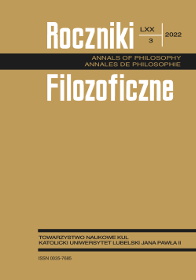Ethics for the Post-Christian World
Abstract
The subject of the article is an assessment of conceptualizations of the theoretical deficits in the doctrine of Christian ethics, both genuine and presumed ones, variously diagnosed by contemporary Christian moral philosophers. The article is a polemic with the theoretical approach to these deficits, as well as an attempt to overcome them, formulated by Sebastian Gałecki in his book Etyka chrześcijańska dla postchrześcijańskiej epoki [Christian Ethics for the Post-Christian Age] (2020). While appreciating the boldness of the theoretical task undertaken in his book, and the theoretical significance of the project of integrating various ethical trends now emerging within Christianity, I point out several serious shortcomings in implementing this commendable venture. I stress, among others, the excessively occidental point of view adopted by the author, questionable operationalization of the category post-Christianity in his diagnosis of contemporary social transformations, his neglect to analyze the causes, endemic to Church institutions, for the people to depart from the Christian ethical canon and the internal inconsistency of the attempt to integrate various theoretical perspectives of the contemporary Christian moral theology.
References
Chmielewski, Adam. 20117. „Saving Christianity through the Benedict Option”. Open Democracy. Free thinking for the world, 11 maja 2017, www.opendemocracy.net/en/can-europe-make-it/saving-christianity-through-benedict-option/. Dostęp 24.08.2022.
Dreher, Rod. 2017. The Benedict Option: A Strategy for Christians in a Post-Christian Nation. New York: Sentinel.
Gałecki, Sebastian. 2020. Etyka chrześcijańska dla postchrześcijańskiej epoki. Kraków: Universitas.
Hauerwas, Stanley. 2016. „Why Community is Dangerous. An Interview with Peter Mommsen”. The Plough, 4 marca 2016, edited for clarity and concision, www.plough.com/en/topics/community/church-community/why-community-is-dangerous. Dostęp 24.08.2022.
MacIntyre, Alasdair. 1996. Dziedzictwo cnoty. Studium z teorii moralności. Biblioteka Współczesnych Filozofów. Tłum. Adam Chmielewski. Warszawa: Wydawnictwo Naukowe PWN.
MacIntyre, Alasdair. 2006. „Epistemological Crises, Dramatic Narrative, and the Philosophy of Science”. W: Alasdair MacIntyre. The Tasks of Philosophy. Selected Essays. Vol. 1, 3–23. Cambridge: Cambridge University Press.
Milton, John. 1952. „Aeropagitica”. W: John Milton. English Minor Poems, Paradise Lost, Samson Agonistes, Aeropagitica. Chicago: Encyclopaedia Britannica Inc..
Polak, Tomasz. 2020. System kościelny, czyli przewagi pana K. Poznań: Wydawnictwo Nauk Społecznych i Humanistycznych UAM.
Schönborn, Christoph. 2005. „Finding Design in Nature”. New York Times, 7 lipca 2005. nytimes.com/2005/07/07/opinion/finding-design-in-nature.html. Dostęp 24.08.2022.
Ziemiński, Ireneusz. 2020. „Chrześcijaństwo: powstanie i upadek mitu. Na marginesie książki Tomasza Polaka System kościelny”. Studia Philosophica Wratislaviensia, vol. 15, fasc. 4: 93-107. DOI: https://doi.org/10.19195/1895-8001.15.4.6.
Copyright (c) 2022 Roczniki Filozoficzne

This work is licensed under a Creative Commons Attribution-NonCommercial-NoDerivatives 4.0 International License.





